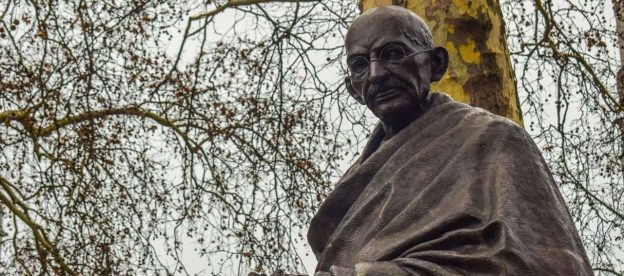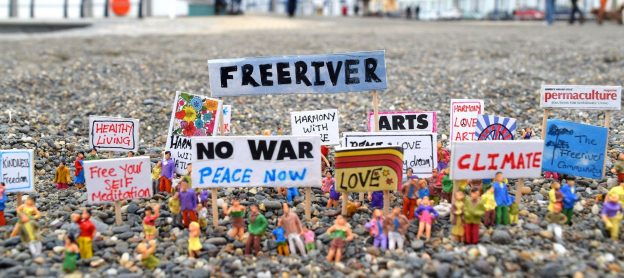1. Two traditions of thinking about nonviolence hold sway.
- Principled nonviolence: Adherents decide to use nonviolent means on ethical grounds. In the Gandhian approach, nonviolence is a way of living a moral life.
- Pragmatic nonviolence: Activists, seeking to win rights, freedom, or justice, choose to use nonviolent techniques because they are more effective than violent means in achieving these goals.
However, in practice, principled proponents, such as Gandhi and Martin Luther King, proved to be adept at pragmatically using nonviolent methods, Equally, some pragmatists hope for a world in which principled nonviolence can exist.
2. Nonviolent resistance (NVR), from the pragmatic viewpoint, is a form of political struggle.
Unarmed civilians employ coordinated and unconventional methods to deter or defend against usurpers and foreign aggressors or to overturn injustices, though without causing or threatening bodily harm to their opponents. Examples of nonviolent methods include demonstrations, protests, strikes, stay-at-homes, boycotts, street theatre, derision of authorities, rebellious graffiti and other communications, shunning of collaborators, building alternative institutions, and many more.
3. NVR is not a doctrine of passive resistance or acceptance of weakness.
It is not passive, but active, demanding coordinated and unconventional struggle. Far from manifesting weakness, NVR demands immense courage of resisters, who are aware their resistance may lead to injury, imprisonment, torture, or even death. NVR is thus not for the weak-hearted. It is a strategy only for those with the determination to persist in the face of repression.
4. The aim of NVR is to build support and undermine the pillars of the opponent’s power.
NVR movements succeed by building up a large and diverse following of activists, winning over passive supporters, and precipitating demoralization and defections among the pillars of the established order (eg, the police, army, bureaucrats, insiders).
5. NVR is effective in comparison to violent campaigns.
Erica Chenoworth, who has undertaken path-breaking research, discovers that, of the 627 revolutionary campaigns waged worldwide between 1900 and 2019, more than half of the nonviolent campaigns succeeded in achieving their goals, whereas only about a quarter of the violent ones succeeded. Nonviolent struggles are twice as effective as violent struggles. Yet the influence of the military-industrial complex, the widespread glorification of violence in popular culture and the equating of masculinity with domination obscure the superiority of nonviolence as a political stratagem.
6. The leverage of NVR stems from the dependence of rulers on the consent of significant sectors of the population (Gene Sharp’s insight).
Rulers cannot rule if bureaucrats obstruct, armed forces and police hold back, people shirk work and ignore laws and regulations, and foreign powers desert. Rulers do not need the support of entire populations; the Nazis could destroy Jews, Roma, the mentally and physically disabled, socialists and union leaders, so long as most ethnic Germans acquiesced to their rule. Hence, the task of nonviolent resisters is fourfold:
- · to build a large and diverse movement
- · to attract the loyalty of passive supporters
- · to encourage the defection of pillars of the regime
- · to attract support in the international community.
7. The effectiveness of NVR depends on many factors.
- Organization: to attract the support of a large and diverse group of supporters.
- Prior coalition building ensures a core of committed activists as unity is critical, the coalition needs both clear, unifying goals, and processes to resolve internal disputes
- Leadership is needed, but it must be decentralized, to make it difficult for rulers to decapitate resistance by arresting its top leaders.
- Training in nonviolent methods: an effective movement must be able to shift tactics as circumstances change. Noncooperation with the regime is one of the most effective sets of methods in the playbook, but these methods require coordinated action.
- Strategic and tactical agility: protests and demonstrations are only the public face of nonviolent action; effective movements employ the full panoply of strategies, depending on the degree of repression by the rulers. The resisters win when they attract the support of passive supporters and precipitate mass defections among the pillars of the established order.
- Nonviolent discipline. Rulers respond to NVR by neutralizing the leaders of the opposition, undermining the movement’s unity, and fomenting violent action on the part of protesters. If the last tactic works, the government can then justify violent repression. It can portray the civil resisters as a terrorist threat. The resisters can succeed only if it is clear to everyone who is the major threat, namely a ruthless and violent governing elite. Thus, destruction of property (such as the destruction of bridges as enemy forces advance) is permissible, so long as it entails no loss of life or injury. Collaborators of the regime can be shunned, but not assassinated. Such nonviolent discipline is difficult to maintain. It runs counter to one’s inclination to respond to violence with violence. The need for discipline underlines the importance of training.
8. NVR can be employed to deter and defeat foreign aggressors, as well as to prevent or overthrow dictatorships and demand rights and justice.
Civilian-based defense, in the words of Gene Sharp in his book of that name (1990) is “a policy [whereby] the whole population and the society’s institutions become the fighting forces. Their weaponry consists of a vast variety of forms of psychological, economic, social, and political resistance and counter-attack. This policy aims to deter attacks and to defend against them by preparations to make the society unrulable by would-be tyrants and aggressors. The trained population and the society’s institutions would be prepared to deny attackers their objectives and to make consolidation of political control impossible. These aims would be achieved by applying massive and selective noncooperation and defiance. In addition, where possible, the defending country would aim to create maximum international problems for the attackers and to subvert the reliability of their troops and functionaries.” History holds many examples of civilian defense, including in Denmark and Norway during Nazi occupation and in Czechoslovakia following the 1968 “Prague Spring,” when a Warsaw Pact army sought to reimpose rigid Soviet-style Communism.
9. NVR became less effective in the period since 2010.
Although nonviolent campaigns worldwide reached unprecedented numbers prior to the 2020 pandemic, their success rate fell. Erica Chenoworth in her 2021 book Civil Resistance provides the statistics. (However, nonviolent resistance remained more effective than violent campaigns.) Chenoworth also offers some tentative reasons for this comparative decline. She highlights “smart repression” by governments and strategic errors on the part of resistance movements. Each is a major subject, and each demands attention if NVR is not to repeat the errors of the past. Restrictions accompanying the pandemic (2020-2022) dampened NVR by rendering mass gatherings illegal and/or dangerous.
10. “Smart repression” needs to be better understood and counteracted.
Nonviolent movements’ strength depends on maintaining unity among a diverse following, sustaining nonviolent discipline, and demonstrating versatility in nonviolent methods. Determined rulers will undermine the movement’s unity, provoke violent responses, and neutralize the leadership. Digital means of communication have assisted NVR movements in mobilizing large numbers of protesters and in spreading their messages via social media. But there is a dark side to digital technology. It allows governments to enhance surveillance of dissidents, identify leaders, and sow discord through misinformation campaigns. The effectiveness of the next phase of NVR depends both on neutralizing smart resistance and returning to the fundamentals of nonviolence: organization, training, nonviolent discipline, and the versatile use of the full panoply of nonviolent techniques


